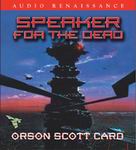
 Speaker for the Dead
Speaker for the Dead
By Orson Scott Card; Read by David Birney, Stefan Rudnicki, Gabrielle de Cuir, John Rubinstein, Scott Brick, Amanda Karr, Lisa Nemacheck, Don Schlossman
12 CD’s – 14 hours [UNABRIDGED]
Publisher: Audio Renaissance
Published: 2005
ISBN: 1593974760
Themes: / Science Fiction / Relativistic Space Travel / Sentient Life / Families / Communities /
Have you ever wished your computer was an intelligent entity you could interact with? Yeah . . . me either. And why don’t we? Because one day when you sit down at your terminal the computer will ask you, “Shall we play a game?” And you’ll say, “How about some Halo 2?” And it will reply back, “How about Global Thermonuclear War?” And unless you think fast and figure out some child’s game that will teach the computer the pointlessness of nuclear war, you’re in a lot of trouble.
There are many other examples of the basic evilness of intelligent computers, like Hal 9000, the recently released Stealth and the entire world of The Matrix.
But in the world of Ender Wiggin there is Jane, restoring hope to all us social skill-less speculative fiction nerds that one day we can be adored by a digital babe. (And don’t give me that “I’m not a nerd, I’ve got skills” stuff–how many other artificial intelligence characters that I didn’t list have you thought of already? Hmm?)
As a sentient, non-human being that interacts with Ender via an interplanetary network of computers, Jane is the ultimate information resource. Not only is she not threatening humanity, Jane is pleasant, caring, and humorously informative. She is easily one of the most likable non-human characters you’ll read, but that isn’t why you should listen to this book.
You should listen to this book because it is a masterwork on human behavior. Orson Scott Card is often praised as a master developer of characters, but if every other book he has written had flopped, this book itself earns him that recognition.
Andrew (Ender) Wiggin was unable to return to earth after he destroyed the Formics in Ender’s Game. Racked by guilt after learning he destroyed a (relatively) innocent form of life, he wrote a book explaining the whole situation, and by doing so became the first “Speaker for the Dead.”
Fast forward a few thousand years. Andrew is only a couple decades older, thanks to the relativistic effects of space travel, and a mythology has developed about him. He is known historically as “Ender the Xenocide,” whose name evokes the same warm fuzzy feelings we associate with the name “Hitler.” “Andrew Wiggin” is also remembered, but as the writer of the near-canonized The Hive Queen and The Hegemon and initiator of the profession of speaking for the dead.
Those around him don’t know that both the Xenocide and the original Speaker were the same person, or that Andrew is him. Andrew is drawn to the colony planet Lusitania to help preserve another sentient species (the piggies). Speaker for the Dead picks up with events that lead to conflict between the piggies and humans, and Ender’s decision to go to Lusitania to help. There he meets the family of a man whose death he is to speak, and who are in the middle of the piggy problems via their scientific/anthropological roles.
As Ender comes to know the family we come to know and love them too. We learn what understandable need or desire or pain is behind their choices. For example, at no point do you agree with the mother’s behavior as years of angry distance from her children starts to bear bitter fruit. But you also see how love, pain and loss have distorted her reality. You despise her behavior, feel compassion for her suffering and understand her intentions. That is reality in all its rich, painful complexity.
But Speaker for the Dead does something even more amazing. It accurately shows the process of change. Change for an individual is a complicated enough process. Showing how a family changes is much more complicated. I am astonished at how accurate that process is portrayed in the book. I have yet to read another book that comes close to describing family change as well as Speaker for the Dead.
Having David Birney and Stephan Rudnicki both narrate the book is like have Shaq and Michael Jordan both on your team in a pick-up game. Those are the only two listed on the CD case, which is really unfair because there is an entire cast and not one person falls short of absolute excellence in their narration. They are the U.S. Olympic Team of readers. The others include Gabrielle de Cuir, John Rubinstein, Scott Brick, Amanda Karr, Lisa Nemacheck, and Don Schlossman.
And while I’m complaining about the case, couldn’t they have put a relevant picture on it? That funky tower thing and the planet surface below it looks like Capitol, but that’s a whole other set of Orson Scott Card stories. I guess the publisher wants the association with the original book cover, but Jane or a pequenino, or any other image actually related to the story would have been nice.
And why stop my spiral of increasingly trivial complaints there? I decided I really don’t like cardboard flap-around cases for the CDs. They are harder to handle, which matters if you are listening while driving, and I think it is easier to scratch a CD in that than in the hard plastic cases with soft sleeves.
I find that I especially like listening to books I have read in the past. If you’re already a fan of Speaker for the Dead, the audio version is a must.
Posted by Mike




